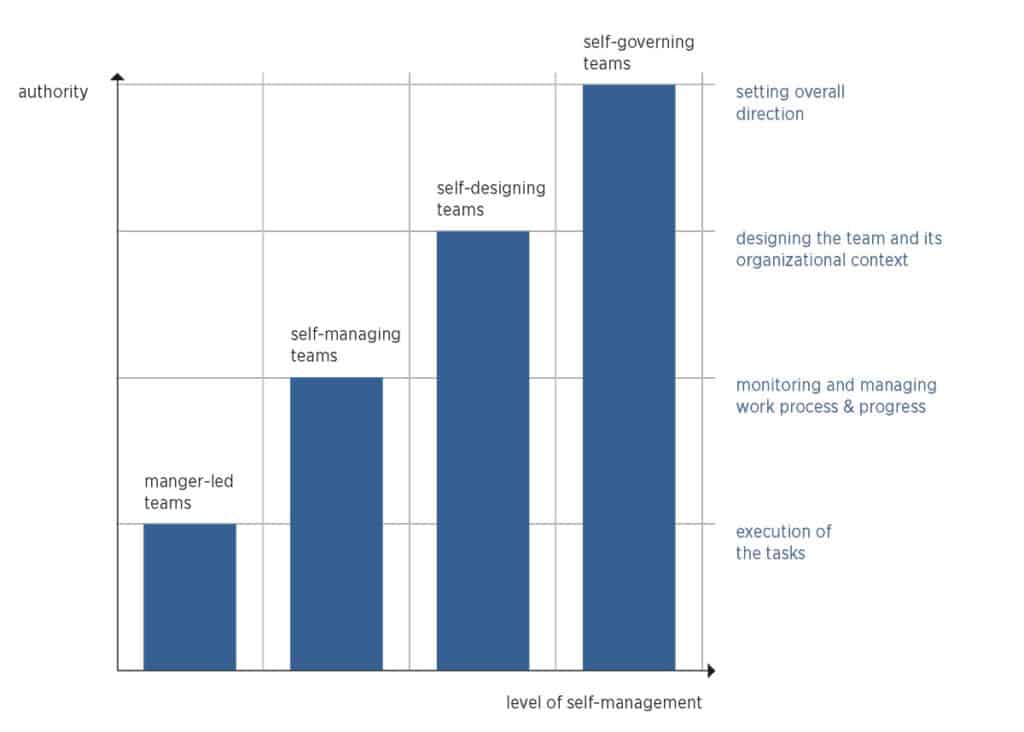Welcome to the three part series on Self-Leadership written and based on Julia Borger’s master thesis “Self-Leadership: Strategies to Avoid Overwhelm in Self-Organized Teams and Companies”.
This first part lays the groundwork to understand overwhelm, how it is defined and what the challenges in self-organization are.
In the second part, “Self-Leadership: Factors Leading to Overwhelm”, we look at factors that lead to overwhelm in self-organized work contexts and how overwhelm manifests.
The third and last part, “Self-Leadership: Tips to Avoid Overwhelm”, is dedicated to tips for employees and of course for companies on how to avoid overwhelm.
Strategies to Avoid Overwhelm in Self-Organized Teams and Companies
What is Self-Organization?
Self-organized work contexts are characterized, among other things, by decentralized leadership, fluid structures, a high degree of autonomy of the participants, high transparency, and roles instead of positions. Hackman (2002) distinguishes four levels of self-organization in teams. He determines these based on the authority a team has to perform the four most critical functions at the leadership and execution levels.
The higher the level of authority – i.e., the more responsibility and leadership tasks are handed over to the team by management – the greater the degree of self-organization and autonomy within a team (see Fig. 1).
Agile teams can be assigned to the second authority level and belong to the category of self-managing teams (Agile Academy, n.d.).

Figure 1: Four Levels of Self-Organization in Teams (according to Hackman, 2002)
Challenges in Self-Organization
To find their way in self-organization, individuals need new competencies and skills.
In the context of decentralized leadership, individuals must learn to lead themselves in order to maintain orientation and establish a sense of order and security for themselves even without hierarchical structures. Such a context requires a great deal of willingness to change in order to be able to respond to constant change in the system.
With a high degree of autonomy, the degree of personal responsibility also increases (e.g., with regard to workload). For example, saying no – an important aspect of self-leadership – thus becomes a prerequisite for finding a healthy measure of tasks and responsibilities in the longer term. Teamwork requires good communication skills and new ways of decision making from all involved.
Furthermore, individuals need an independent working style and the ability to set their own goals and priorities and to motivate themselves. On a personal level, a way of dealing with social control and transparency must be found. Reflectiveness must be developed because it is an important prerequisite for learning and adaptability in self-organized work contexts in various respects.
Definition of Overwhelm
Overwhelm is a physical and mental state that occurs in the course of a stress response whenever a stressor that has occurred cannot be neutralized with known behavioral and coping strategies (competencies, skills, thinking strategies, etc.) and available resources.
Since overwhelm is a result of a biological stress response, this state can be accompanied by various mental, physical, psycho-emotional, or behavioral stress signals. The subjective feeling of being overwhelmed is one of these stress signals.
Read the second part of this three-part series, Self-Leadership: Factors Leading to Overwhelm
About the Author

Julia Borger is an expert for self-leadership and empowerment. In the summer of 2021, she successfully completed her master’s degree with a thesis on the topic of “Overwhelm in Self-Organization”. This is how she discovered the topic of “self-leadership” to be a matter close to her heart.
Overwhelm has accompanied her for a long time and therefore it was like an enlightenment for her to understand the mechanisms behind it. She would like to pass on this knowledge to create awareness and enable transformation. It is her great desire to enable individuals and teams to come into their strength and to unfold their potential.












